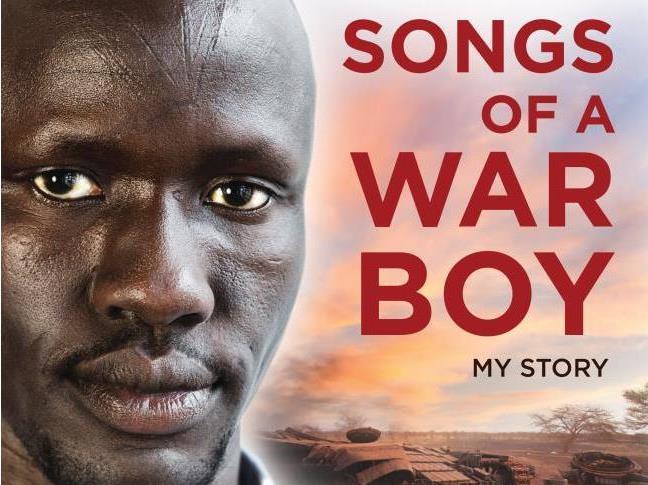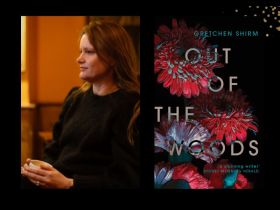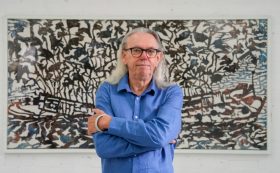Image: cover art for Songs of a War Boy. Cover art by Christabella Designs.
Deng Thiak Adut. The name might ring a bell – you might have seen his recent Australia Day address, or you might have watched the advertisement for Western Sydney Uni that tells some of his life story. Or this might be the first time you’ve heard his name. I hope that it is far from the last.
Recently, Deng published an autobiography, Songs of a War Boy, co-authored with Ben Mckelvey. For those who aren’t familiar with Deng’s story, the broad strokes are as follows: born to village life in South Sudan, Deng was conscripted to the Sudanese People’s Liberation Army (SPLA) at age six. After facing gruelling desert marches, disease, torture and active combat, Deng was able to escape South Sudan and, eventually, come to Australia. Through his own resilience and hard work, his brother’s support, and the kindness of other Australians, Deng made his way through his schooling, and then a law degree and now runs a criminal law firm in Western Sydney.
The book opens beautifully with a long, detailed, reverent account of his family history and his place within his family and his clan, the Dinka-Bor. This prologue is a tremendous introduction to Deng’s personal context; there is a lot about his culture that is distinct from mainstream Australian culture – and the book does seem to be addressed to mainstream Australia.
Though the content is deeply touching, Adut and Mckelvey are restrained in their tugs on our heartstrings. So much so that throughout the chapters where Adut is at war, the book slides into a style not dissimilar from historical accounts of the World Wars – tactical movements described with a cold rationality and strategic interest. The effect of this stylistic choice could be said to be similar to the desensitisation that Adut incurred during his soldier training with the SPLA – we aren’t overwhelmed with the tragedy of the situation, and neither, he tells us, was he.
When Adut arrives in Australia, the book returns to the nuances of Adut’s singular perspective – just as Adut returns to himself and begins the slow process of reclaiming himself from his days as a soldier. There are tremendous insights here about the importance of community and being surrounded by people like oneself. Adut recounts a moment when he was walking down a street in Australia and, for the first time, saw another African walking on the other side of the street. He immediately crossed the street and introduced himself. Adut was eager to integrate into Australian society but he also emphasises the importance of having spaces that were just for him and people like him – people who looked like him, and who had lived similar things. There are also startling moments about Adut’s internal relationship with his identity as a soldier. The story Australia probably wants to hear is about how terrible it was to be a child soldier and how lucky he was to get away. But Adut doesn’t afford us this simplicity; instead, he is open about his desires to return to the battlefield, and the way that his soldier’s training created a void that couldn’t be filled until he found the discipline and structure of a local soccer team.
Although they are still chronically underrepresented in western mainstream cultures, it has been a good couple of years for black voices in literature, here and abroad. Roxane Gay, Ta-Nehisi Coates, Stan Grant, Teju Cole, Nakkiah Lui and Paul Beatty are just a few names that come to mind. All of these voices speak from varying places of defiance, of reclaiming, of righteous impatience, and I have loved reading their words and feeling the ways that they are decolonising literary spaces bit by bit. In this context, I was surprised to feel a bit of discomfort at Adut’s almost unreservedly positive view of Australia. He speaks of being proud to be Australian; he speaks of the unrivalled generosity of the Australian people, or of the fact that there is a ‘surmountable level of injustice’ in our country. He doesn’t pretend racism doesn’t happen – he addresses it openly, a number of times – but he maintains a firm belief that Australia is good and can overcome its racist tendencies. With these sentiments, Adut addresses his book firmly (and at times explicitly) at mainstream Australia, expressing a hope that his story might provide some context, the next time the Average Australian Citizen sees an African in the street. The book ends with a kind of plea for the reader to open their mind to the value of refugees, as human beings and as productive, loyal Australians. This ending to the book drew my mind back to the book’s opening epigraph, taken from Kahlil Gibran’s The Garden of the Prophet. Here is an excerpt from the passage used by Adut:
Pity the nation that raises not its voice
save when it walks in a funeral,
boasts not except among its ruins,
and will rebel not save when its neck is laid
between the sword and the block.
When I began reading the book, I thought the inclusion of this passage was a pithy trick, designed to be read as a possible critique of both East Africa and of Australia. By the end of the book, it seems clear that this passage is aimed much more at the former than the latter. Adut expresses a desire that the nations and peoples of the world can move beyond ‘tribalism’ and experience lasting compassion for one another. Whether or not Australia deserves the praise and faith vested in us by Adut, he certainly makes one want to strive to live up to his vision of the nation he now so proudly calls home.
SONGS OF A WAR BOY
By Deng Thiak Adut & Ben Mckelvey
Published by Hachette
Available now





